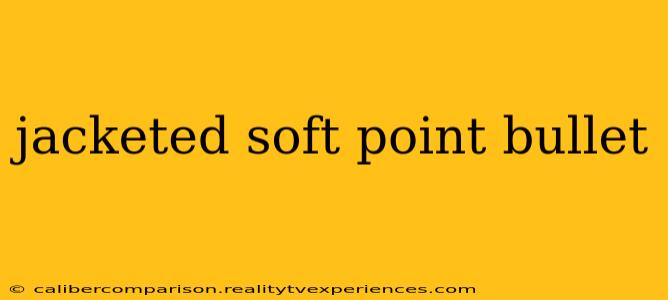The world of ammunition can be complex, with a wide variety of bullet designs catering to different needs. Among these, the jacketed soft point (JSP) bullet stands out as a versatile and popular choice for hunting and target shooting. This comprehensive guide delves into the specifics of jacketed soft point bullets, exploring their design, performance characteristics, and suitability for various applications.
Understanding the Jacketed Soft Point Bullet Design
A jacketed soft point bullet, as the name suggests, features a lead core encased in a metal jacket. Unlike full metal jacket (FMJ) bullets, which have a completely enclosed lead core, the JSP bullet exposes a portion of the lead core at the tip. This exposed lead core is what differentiates its performance. The jacket, typically made of copper or gilding metal, provides stability during flight and protects the rifling in the gun barrel from lead fouling.
Key Design Features and Their Impact:
- Exposed Lead Tip: This is the defining feature. The soft lead core at the tip expands upon impact, creating a larger wound cavity and increasing stopping power. The degree of expansion varies depending on the bullet's construction, velocity, and the material it strikes.
- Metal Jacket: The jacket ensures consistent accuracy and reduces leading (lead buildup in the barrel). It also provides better ballistic performance compared to a completely lead bullet.
- Boat Tail Design (Often): Many JSP bullets incorporate a boat-tail design, which is a tapered rear end. This contributes to increased accuracy and longer range by reducing drag.
Performance Characteristics of Jacketed Soft Point Bullets
JSP bullets offer a compelling balance of performance traits making them suitable for a range of applications:
- Expansion: The hallmark of the JSP is its controlled expansion. Upon impact, the exposed lead core mushrooms, increasing the diameter of the bullet and transferring more energy to the target. This results in greater stopping power and increased lethality in hunting applications.
- Penetration: While expanding significantly, JSP bullets generally retain sufficient penetration to ensure a clean kill in hunting situations. The balance between expansion and penetration is a key factor in their design.
- Accuracy: The jacketed design and often-included boat tail contribute to better accuracy compared to fully lead bullets. This is crucial for both hunting and target shooting.
- Recoil: Similar to other bullets of comparable weight and caliber, recoil characteristics depend on the firearm and cartridge.
Applications of Jacketed Soft Point Ammunition
JSP bullets find widespread use in several contexts:
- Hunting: They are a popular choice for various game animals, from deer to larger game, depending on the caliber and bullet weight. The controlled expansion and penetration make them effective for clean, humane harvests.
- Target Shooting: Their accuracy and consistency make them suitable for target practice and competitive shooting.
- Self-Defense (Limited): While not typically the first choice for self-defense due to potential over-penetration risks in densely populated areas, JSP bullets can be used in self-defense situations.
Choosing the Right Jacketed Soft Point Bullet
Selecting the appropriate JSP bullet depends on several factors:
- Caliber: The caliber of your firearm dictates the bullet diameter you can use.
- Game Animal: The size and type of game you're hunting will influence the required bullet weight and energy.
- Range: The intended shooting range will affect the bullet's design and ballistic coefficient.
- Manufacturer: Different manufacturers have varying designs and performance characteristics, so research is crucial.
Choosing the correct ammunition for your specific needs is critical for safety and effectiveness. Always consult with experienced shooters or hunting guides if you have any questions or uncertainties. Understanding bullet design and performance is an essential part of responsible firearm ownership.

